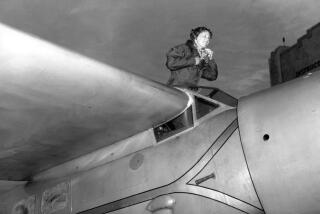1982 Death Just Reported : Jean Batten; Flier Almost as Famous as Earhart
- Share via
Jean Batten, an aviator who 50 years ago was nearly as widely known around the world as Amelia Earhart, died in obscure poverty five years ago and is buried in a pauper’s grave in Spain, the Times of London reported this week.
The woman who once shared the International League of Aviators (Harmon) Award with Howard Hughes was believed to have been 73 when she died.
In an obituary headlined “Daughter of the Skies”--a title she was given by a Maori tribe in her native New Zealand--the Times wrote of the days when thousands would show up at airports around the world to see Miss Batten take off and land on several record-breaking flights.
‘Garbo of Aviation’
But after World War II, she was never known to fly again, and she was seen only occasionally, living a reclusive life at her homes in Jamaica and on the Spanish islands of Tenerife and Majorca.
The Times said she had not been seen publicly since 1982, when she was recognized on a flight from London to Majorca.
Another British paper, the Daily Telegraph, reported that relatives in New Zealand had been unsuccessful in tracing Miss Batten until last week, when Spanish authorities said she had died of natural causes Nov. 22, 1982, at 73. The Telegraph called the solitary flier “the Garbo of aviation.”
Her body was buried in an unmarked pauper’s grave on Majorca in January, 1983, because no one claimed it, the newspaper said.
Miss Batten, who never married, ended her flying career at 30, after she had been decorated by the governments of Britain, France and Brazil.
Cut 5 Days Off Record
She began shattering aviation records in 1934, when she was only 25. Miss Batten took 15 days to fly a Gypsy Moth from England to Australia, cutting nearly five days off Amy Johnson’s record for that flight. She also set records for solo flights across the South Atlantic to Argentina. She and Hughes were given aviation’s highest award, the (Col. Clifford) Harmon Trophy as outstanding man and woman in aviation for 1936, he for record flights across the United States, she for being the first of her sex to cross the South Atlantic alone.
Her autobiography, “My Life,” first appeared in 1937, and it was reissued in 1979 as “Alone in the Sky.”
Miss Batten left New Zealand when she was 20 to move to London, where, instead of studying piano as she planned, she took lessons and received a pilot’s license.
When World War II began, Miss Batten wanted to serve as a ferry pilot in the air transport field--the only flying role for women in the war--but a shoulder injury from one of her many crashes disqualified her from military service.
More to Read
Sign up for Essential California
The most important California stories and recommendations in your inbox every morning.
You may occasionally receive promotional content from the Los Angeles Times.













